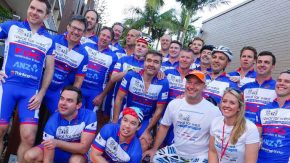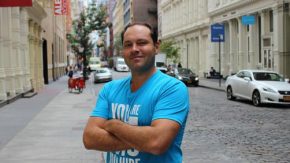Scientist Derrick Roberts (ON 2006) Awarded Prestigious Fellowship
The Marie-Curie Fellowships are ranked among Europe’s most competitive and prestigious awards and are aimed at fostering interdisciplinary research and international collaborations. Derrick Roberts (ON 2006) will take up a postdoctoral position at the Karolinska Institutet in Sweden from 2017. He will be working with Professor Molly Stevens, one of the most celebrated biomedical engineers in the UK in the area of regenerative medicine. His project will centre upon developing new dynamically-responsive hydrogels for accelerated healing in chronic wounds.
Since January 2013, Derrick has been pursuing a PhD in Chemistry at the University of Cambridge. His research focuses on molecular self-assembly — a subfield of chemistry that focuses on programming small molecules to autonomously build themselves into large, functional architectures.
Derrick’s fundamental research into molecular self-assembly processes is helping to lay the groundwork for building new nanotechnology.
“There is a potentially huge market for combining molecular self-assembly and polymer chemistry to develop new ‘smart’ plastics that can fold into protein-like structures, which could form the basis of highly efficient solar cells or make replacement parts for damaged cellular machinery. Scientists still have a lot to learn about how to control the self-assembly of small molecules into much larger, useful molecular clusters. Nature has more or less perfected molecular self-assembly, from the processes that govern DNA recognition and protein folding up to the organisation of cells and entire organisms. If chemists can figure out how to emulate these processes in the lab, a whole new generation of incredible technologies will suddenly be possible.”
As part of his PhD research programme, Derrick is taking part in a £500K EPSRC-funded project to investigate synthetic protein-like molecules for better understanding cystic fibrosis, and potentially develop a treatment regime for this devastating disease.
Read review article about the nature of the fellowship, and it’s contribution to Europe’s Horizon 2020 program here.





